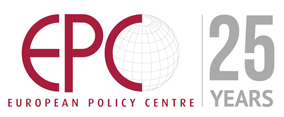Reconciling competitiveness and economic security
(October 11, 2023, – European Policy Centre – EPC)
Speakers:
- Anders Opedal: President and Chief Executive Officer, Equinor
- Tinne Van der Straeten : Minister of Energy, Federal Government of Belgium
Moderator:
- Fabian Zuleeg : Chief Executive and Chief Economist, European Policy Centre
The aim of this hybrid dialogue, organized by EPC in partnership with Equinor, is to understand how to strike a balance between energy security and competitiveness, more than a year after the beginning of Russia’s invasion of Ukraine. The goal is to comprehend the challenges facing Europe in this context of “permacrisis” and to identify potential solutions for ensuring competitive energy security within the European Union.
Energy Challenges in Times of Permacrisis
“Who wants to be a minister or a CEO in these challenging times?” is the question asked at the start of her speech by Tinne Van der Straeten, Minister for Energy in the Belgian federal government. And with good reason. More than a year after the commencement of Russia’s invasion of Ukraine, numerous energy challenges have become intertwined in Europe today. The first, as the Minister reminded us, is the fact that “Russia has turned energy into a weapon“, not only against Ukraine by directly targeting the country’s energy installations, but also against Europe by manipulating markets and exploiting volatility. In this context of war, energy has also become a major security issue, as illustrated by the sabotage of Nord Stream 1 and 2, as well as suspicions of sabotage in the Baltic Sea.
The consequences are evidently significant for European citizens and companies. In his keynote address, Anders Opedal, President and Chief Executive Officer of Equinor, the Norwegian oil and wind energy company, also emphasized to the audience that, in addition to the economic challenges posed by war, Europe and the world must confront the rapidly accelerating pace of climate change. He highlighted the fact that the energy transition is currently progressing far too slowly to meet established targets and effectively mitigate future disasters. The ultimate challenge, directly intertwined with the first two, is evidently the impact that this crisis context has on households. The social consequences of energy costs are substantial today, despite the efforts made by EU countries to respond.
So, in this permacrisis context, where several aspects are interwoven, how do we secure supply and prices? How do we manage security? And how can we navigate social effects, inflation and rising production costs while simultaneously addressing the challenges of climate change?
Shifting from Reaction to Anticipation: The Imperative of Investments
Can we transition from a mode of reaction to one of anticipation and consider the long-term structural choices we need to make?
For both speakers, the most pressing issue is the urgent need for investments, despite the challenging situation in which countries and businesses find themselves today. Investments are necessary now to prepare for the future and address the challenges. According to the Belgian Minister of Energy, Belgium’s current economic difficulties should not act as a deterrent. If we delay and fail to invest in infrastructure today, the situation will worsen tomorrow, and subsequent energy transition or crisis anticipation steps will not be able to keep up. Both of them are calling for immediate and tangible action from countries, the European Union, and companies alike.
The two speakers highlighted several concrete actions taken in recent months to address this challenge. These actions include the Repower EU plan at the European level and multilateral initiatives, such as the North Seas Summit held in Ostend last April. Additionally, there is the ongoing development of an artificial energy island for interconnection with Belgium, Denmark, and potentially Norway in the future. The Belgian minister also underscored the importance of this field for Belgium, as the country is poised to assume the presidency of the EU Council on January 1.
Anders Opedal also emphasized the actions taken to reduce his company’s carbon emissions, as it strives to achieve net-zero carbon emissions by 2050. He called for action on different fronts : The development of various technologies to determine the most suitable solution for the future, emphasizing the importance of market openness, cooperation between states and companies, and competition to ensure that the energy transition does not lead to unnecessary higher costs for individuals and industries. Anders Opedal suggests that the legal framework should not be overly restrictive on technologies because, at present, we cannot predict which energy sources developed today will be the most viable and valuable in the future. He calls for a balanced approach, avoiding excessive constraints on our energy ambitions to ensure that emerging technologies have the opportunity to develop and potentially offer valuable solutions for the future.
Addressing Criticism and Urgency in Energy Transition
There is considerable criticism of the energy transition nowadays. Many argue that it’s not progressing quickly enough, while others find it too costly. In fact, the UK is starting to scale back its climate and energy policies. For both speakers, it’s evident that despite the associated expenses, investment is imperative because climate change jeopardizes human lives. Striking a balance is necessary to address the concerns of activists who believe that progress is not happening rapidly or extensively enough. The reality is that we still rely on oil and gas today. Investments are required now to reduce emissions, but this process can be time-consuming and costly.

